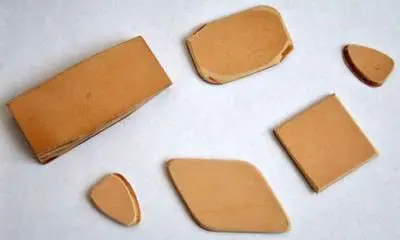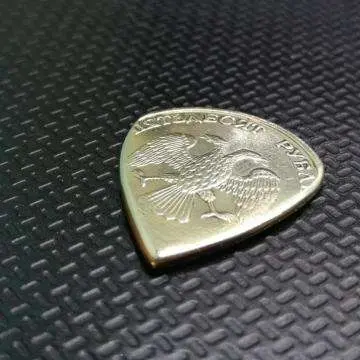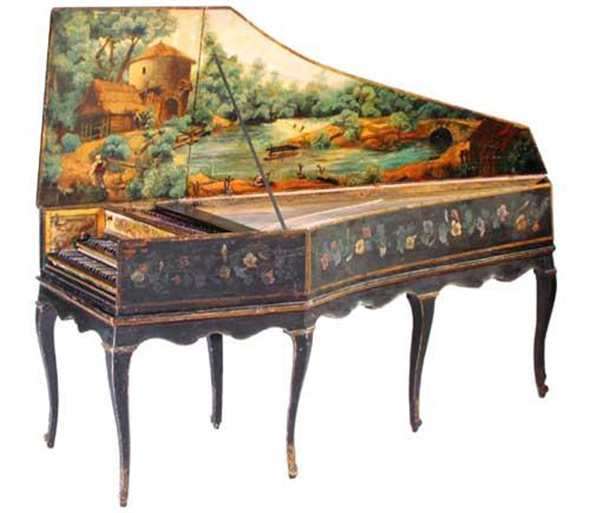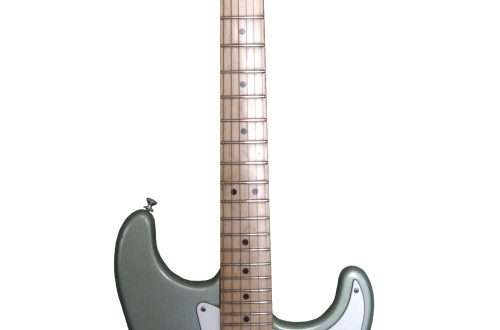
How to make a mediator with your own hands
Contents
A pick is a small but very important accessory for a guitarist. No wonder this word can be translated into Russian as “intermediary”. This small drop-shaped or triangular piece helps the musician to extract from the instrument the sounds that the performer needs in this composition. Unfortunately, due to its small size, it is often lost. And although the cost of a new plectrum is not too high, there are still situations when a new pick is not at hand .
In this case, you can make it yourself.
What can a mediator be made of
Here the fantasy of the master knows no bounds. The pick should be both firm and at the same time slightly flexible. Many materials satisfy such conditions, so the choice can be made according to the principle: “what I saw at hand, I made it out of it.” In addition , the use of improvised items reduces the cost of the mediator . So, we list the most popular materials that, most likely, everyone can find.
Leather
 Rarely used for guitar – more often for folk stringed instruments. However, ukulele players also play with leather picks .
Rarely used for guitar – more often for folk stringed instruments. However, ukulele players also play with leather picks .
For crafting, you will need an old leather belt. If you make the pick not too big, then it will bend less and allow you to play comfortably. The sound will be soft and muffled, and the strings will hardly wear out.
Sheet metal
Suitable material of a certain thickness. Of course, you can’t make a mediator out of a sheet that is too thin, like canning sheet – it will cut your hands, it will be difficult to hold it. The best option is soft aluminum-based alloys. The mediator can be cut with scissors for metal or even cut off the workpiece with a grinder, but fine-tuning can be done exclusively with a file, and a little later with a needle file. A metal pick is suitable for a strong attack with a powerful ringing overtone, but it will wear out the strings quickly.
Coin
 A subspecies of a metal pick , which is made from a coin. Changing the shape of a sufficiently thick product is long and troublesome – it is easier to slightly taper the thickness in the region of the working end. To do this, the coin is clamped in a vice and the edge is processed with a file. A standard 5-ruble coin is best suited. A more exclusive product can be made from a coin of foreign circulation.
A subspecies of a metal pick , which is made from a coin. Changing the shape of a sufficiently thick product is long and troublesome – it is easier to slightly taper the thickness in the region of the working end. To do this, the coin is clamped in a vice and the edge is processed with a file. A standard 5-ruble coin is best suited. A more exclusive product can be made from a coin of foreign circulation.
sheet plastic
A versatile option that will suit most styles, techniques and string types. Any flexible enough option will do. However, there are options for everyone:
Plastic cards . Banking, SIM, loyalty cards of supermarkets and retail chains – everyone has a dozen unnecessary or expired plastic rectangles. The material from which they are made is moderately soft and flexible. The thickness is close to standard mediators . A plectrum made from a plastic card wears out quickly, but it also costs almost nothing, except for a couple of minutes of labor. By the way, plastic cards can be sharpened or burrs removed from it with an ordinary nail file or buff. It is better to cut with scissors, in which the handles are longer than the blades.
CDs . Once a collection of films on DVD was the pride of any cinephile. Today, when everything is on the Internet, disks are sent to the garbage chute or for crafts. Due to the strength of the plastic base, they make excellent picks . True, the material is prone to splitting with careless cutting. Therefore, disc mediators require a special approach. First, the blanks are marked out, then a deep groove is made along the contour with a sharp knife, and only after that they are cut with scissors or a knife. A strong clerical knife with a thick blade or a drywall knife will work well.
Wood
Very rare material due to its specificity. The fact is that for a home-made mediator , you need to find solid wood – oak or ash. It is best to grind the workpiece on an emery wheel, which requires certain skills and time.
At the same time, it cannot be denied that wooden plectrums turn out to be interesting, “atmospheric” products that are not ashamed to be presented as a gift.
Determining the shape and size of the mediator
 The best way to choose a pick size is to take a factory piece that you feel comfortable playing with and remove the template from it. Unfortunately, the need for a new mediator e arises when the previous one is lost. In this case, the size and shape are determined experimentally. You should rely on the following standard:
The best way to choose a pick size is to take a factory piece that you feel comfortable playing with and remove the template from it. Unfortunately, the need for a new mediator e arises when the previous one is lost. In this case, the size and shape are determined experimentally. You should rely on the following standard:
- 30 mm long;
- 25mm wide;
- from 0.3 to 3 mm in thickness.
In this case, the thickness parameter largely depends on the starting material. But the ratio of planar dimensions is set by the guitarist independently.
As for the most common forms, most often the mediator is cut out:
- classic (isosceles triangle with rounded corners);
- drop-shaped;
- jazz oval (with a sharper tip);
- triangular.
How to make a mediator with your own hands
The plectrum, which is cut out of plastic, is not difficult to manufacture. However, more complex copyright mediators can also be made , for example, their piece of wood and epoxy resin.
What will be required
- Transparent epoxy resin with hardener.
- A small piece of wood with a beautiful break (pros recommend black hornbeam, but you can use any other, charred in the fire of a lighter).
- Plexiglas form or any trough.
- Stencil to size plectrum a.
- File, needle file, fine-grained sandpaper.
Step-by-step algorithm of actions
- Put a thin piece of wood with a beautiful break in the trough.
- Fill with epoxy and add hardener.
- When the mass thickens, but has not yet hardened, use a toothpick or a pin to make stains in a transparent mass.
- Wait for complete solidification within 24 hours, then shake the workpiece out of the mold.
- Attach the template and grind the epoxy blank with a piece of wood in thickness to the desired size.
- Sand the surface to a smooth state with sandpaper.
Conclusions
Any guitarist should certainly master the technique of making a pick on their own , because losing this small but important item costs nothing. With a sharp knife and skill, you can make a plectrum from improvised means in no time.





